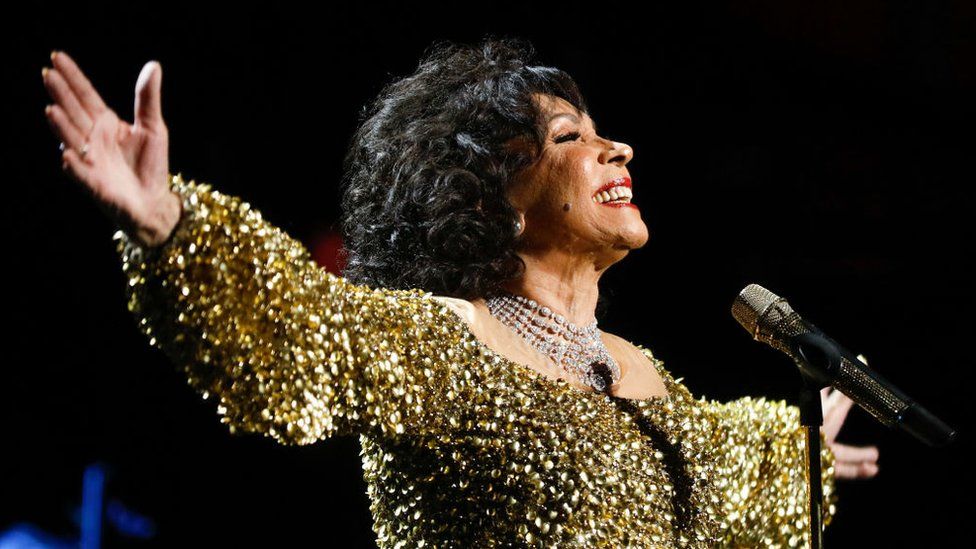ARTICLE AD BOX
 Image source, Getty Images
Image source, Getty Images
Dame Shirley Bassey is one of Wales' most famous stars
She's recorded three James Bond theme songs and boasts a career spanning seven decades, but Dame Shirley Bassey's huge fame means other black Welsh singers are "forgotten about", say some in the industry.
"Recognition for black Welsh musicians hasn't been helped by the fact that there's one very famous singer who overshadows everybody," rapper Lemfreck said.
"They pull out Shirley Bassey every time they need to pull out a black icon," said musician Dionne Bennett.
The comments were made in new documentary, Black Music Wales.
Fronted by Newport rapper Lemfreck, the programme explores the history of Welsh black music, from pioneers of the past to new artists.
Image source, Getty Images
Image caption,Dame Shirley Bassey is known for her powerful voice, sequined gowns, and lavish jewellery
"I think because Shirley Bassey is one of the most famous singers to come from Wales too many singers are all forgotten about," said DJ and event programmer Kaptin Barrett.
DJ and broadcaster Kervin Julien added: "I'm not going to disrespect Shirley Bassey in any shape or form.
"She's an absolute legend but let's just get it right, sometimes it sounds like the only thing we've ever had is Shirley Bassey."
"Why are we still talking about Shirley Bassey?" said Dionne Bennett.
"Why was I compared to Shirley Bassey? I'm nothing like Shirley Bassey."
Image source, Getty Images
Image caption,Shirley Bassey was born in the Cardiff docks area formerly known as Tiger Bay
Black music in Wales can trace its roots back to the late 1800s when sailors and ship workers from more than 40 countries began to settle in a community around Cardiff docks.
Tiger Bay became well-known for jazz musicians, calypso bands and blues parties.
Its most famous former resident may be Dame Shirley but other musical stars such as Frank and Joe Deniz, Victor Parker and Patti Flynn also hail from the area.
"There was at least one pub in every street in Tiger Bay and all of those had pianos and all of them had nights where people would get up and sing... the music was all over the place in Tiger Bay," former resident and historian Gaynor Legall told the documentary.
In the '70s and '80s the area's Casablanca club became one of the few places where you could dance to reggae and people flocked to Cardiff's and Newport's carnivals.
As well as telling the stories of some of Wales' forgotten black musicians from the bygone times, Lemfreck wants to shine a light on the current modern Welsh black music scene, which he said was having "a real moment".
He hears the experiences of a number of other black Welsh musicians, including Juice Menace, Mace the Great, Sage Todz and Aleighcia Scott.
He is keen to find out what barriers they have had to overcome.
Image source, BBC/Lazerbeam
Image caption,Juice Menace is the voice behind the Wales women's 2023 World Cup soundtrack
Rapper Juice Menace started making music when she was 17.
Since then she has got over 4 million streams online, played Glastonbury and recorded the official song for the Wales women's football team.
She began by posting tracks on social media before leaving her studies at Cardiff and Vale College and moving to London to pursue her career.
"I would have liked to have stayed here but back in 2019... [but] personally I just didn't feel there was that opportunity for me here at the time or I can say I didn't feel like a lot of people were trying to give me a shot," she told Lemfreck.
After a few years she returned home and recorded her debut EP 029 - named after Cardiff dialling code 02920 - at Cardiff's Silk Crayon Studios.
She puts the current moment for Welsh black artists down to "opportunity and a lot more people being courageous enough to just shoot their shot. When there's enough people doing something and it makes noise you can't ignore it any more.
"I think going to London took that Cardiff flair off me a little bit - a lot of people didn't know not only is it where I'm from, I'm proud to be from here. It's not something I shy from ever, it is who I am," she said.
Image source, Marcus Georges
Image caption,Mace the Great is a Cardiff-based rapper
Mace the Great has released two critically acclaimed albums and has played at Glastonbury and South By South West in Texas.
In March 2023 he released Splott World - a whole album dedicated to the area of Cardiff in which he was brought up.
"I am so Cardiff bro, the way I talk, the slang I use, through and through Cardiff, that's what sets me apart from London-based rappers or English rappers," he told Lemfreck.
He said he wouldn't consider leaving Cardiff.
"I always felt like if I wanted things to change here, for more opportunities to come available here, If I move to London and just get Londonised I'll still be a Welsh guy in London but it's not the same.... I'm inspiring younger people to let them know we can do it from here."
Image source, BBC/Lazerbeam
Image caption,Rapper Lemfreck grew up in St. Julians in Newport
He said there were still barriers for black Welsh artists.
"I just feel like certain opportunities weren't as accessible for me being a black kid who raps rather than being an indie band from west Wales," he said.
"It feels like more opportunities were there, just laid out for people coming from that walk of life rather than mine.
"And why am I the only Welsh rapper going to South by South West... is there a shortage on rappers in Wales? No... it's having representation in these rooms where these conversations are being held bro."
"I think there are people who are still controlling the music industry in Wales. I don't think they understand the wider industry, it's changed. We need more change from grass-level up," she said.
"I want to see black record labels, black festivals for black artists run by black people - then we've got change."
Black Music Wales is available on BBC iPlayer.

 1 year ago
28
1 year ago
28








 English (US) ·
English (US) ·